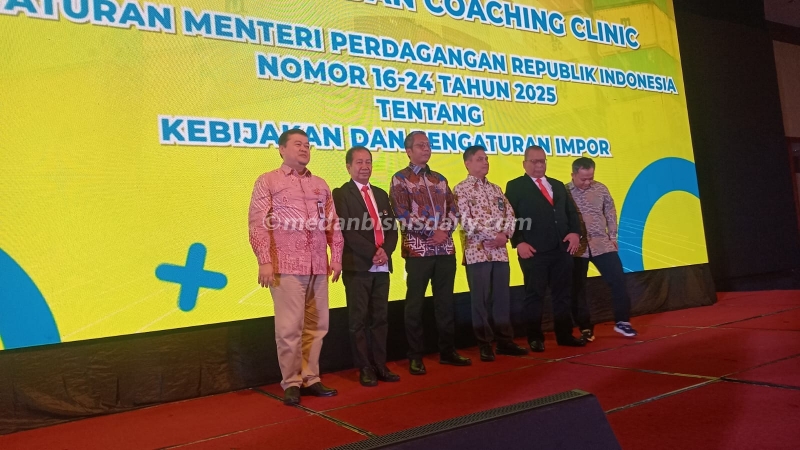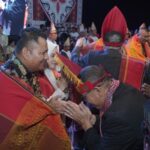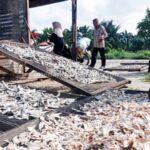The government, through the Ministry of Trade, has implemented regulatory changes (deregulation) to relax the process and legalization of imports for 482 harmonized system (HS) codes in response to global trade dynamics and geopolitical changes.
This deregulation was presented at a Socialization and Coaching Clinic event organized by the Regional Leadership Board of the National Importers Association of Indonesia (GINSI) of North Sumatra in collaboration with the Ministry of Trade.
The event, attended by dozens of business players, particularly importers and business associations from North Sumatra, along with officials from the Central Ministry of Trade and the Department of Industry and Energy and Mineral Resources of North Sumatra, was held at the JW Marriott Hotel in Medan.
It was stated that the deregulation was carried out through the issuance of nine Minister of Trade Regulations. These nine regulations consist of Minister of Trade Regulation No. 16 of 2025, No. 17 of 2025, No. 18 of 2025, No. 19 of 2025, No. 20 of 2025, No. 21 of 2025, No. 22 of 2025, No. 23 of 2025, and No. 24 of 2025.
Effective starting August 29, 2025, these nine regulations relax the import legitimization process for 482 HS codes.
The relaxation of the import legitimization process means that, whereas previously all 482 HS codes required an Import Approval (PI) process and a Surveyor Report (LS), after the relaxation, the import process only requires a surveyor report appointed by the Ministry of Trade.
On that occasion, an overview of each Minister of Trade Regulation was presented, covering the importation process, import reporting procedures, and the sanctions that will be imposed on importers who fail to comply with the established regulations.
It was hoped that importers would carefully study and adhere to these new provisions to avoid sanctions.
It was mentioned that the event was held to help importers in North Sumatra understand the latest regulations in the field of imports.
Also present at the event were the heads of various business associations.
JW Marriott Hotel
The JW Marriott Hotel is a luxury hotel brand established by Marriott International, with its first property opening in Washington, D.C. in 1984. Named after the company’s founder, J. Willard Marriott, the brand is designed to offer a more refined and tranquil experience than its sister brands, focusing on personal well-being and mindful hospitality.
Ministry of Trade
The Ministry of Trade is a government department responsible for regulating a nation’s commerce, industry, and international trade relations. Historically, such ministries were established as countries industrialized to develop and protect their economies through policies like tariffs and trade agreements. Its specific history and founding date vary by individual country.
National Importers Association of Indonesia
The National Importers Association of Indonesia (Asosiasi Importir Nasional Indonesia or ASPINDO) is a key trade organization established to represent and support the interests of the country’s import businesses. It was formed to facilitate trade, advocate for favorable import policies, and help integrate Indonesian businesses into the global economy.
Department of Industry and Energy and Mineral Resources
The Department of Industry and Energy and Mineral Resources is a government ministry in the Kingdom of Saudi Arabia. It was established to develop and regulate the nation’s industrial and mining sectors, which are central to the country’s economic diversification strategy under its Vision 2030 plan. The ministry oversees the development of the Kingdom’s vast mineral resources and works to attract investment into these non-oil industries.
North Sumatra
North Sumatra is an Indonesian province on the island of Sumatra, most famous for being home to Lake Toba, the largest volcanic lake in the world formed by a supervolcanic eruption over 74,000 years ago. The region is the cultural heartland of the Batak people, whose distinct traditions, unique architecture, and historical kingdoms have shaped its identity for centuries.
Medan
Medan is the capital of North Sumatra, Indonesia, and a major economic hub on the island. Historically, its growth was fueled by the 19th-century Dutch colonial plantation industry, particularly tobacco, which led to the construction of grand colonial buildings like the Tjong A Fie Mansion. The city is also a gateway to the natural wonders of Sumatra and is known for its diverse culinary scene, reflecting its Malay, Batak, Chinese, and Indian cultural influences.






